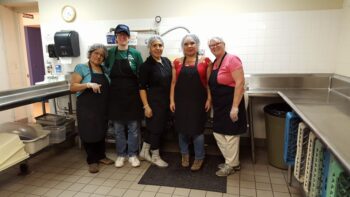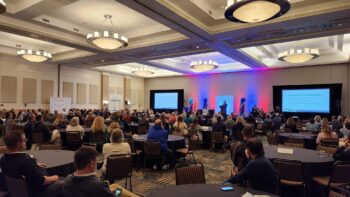By John Mai
Churches in the Minneapolis Area Synod are looking beyond traditional mission support to develop their congregations. The old funding sources just don’t always fill the gap anymore.
Pastor Melissa Gonzalez of Tapestry offers, “I ask God: Why do I have to fundraise so much?” She believes that her job would look completely different if fundraising was taken off her plate.

Member of Tapestry provide food as part of hospitality, but it comes at a cost — the need to fundraise.
Tapestry is a ministry under development in the Minneapolis Area Synod, and is a recipient of the ELCA’s Domestic Hunger Grants. Annually, the ELCA makes this grant available to congregations and affiliated organizations. Tapestry will be receiving funds for multiple years, and Gonzalez is grateful for the flexibility that these funds offer. “This first year,” she says, “we’re kinda just gonna play around a little bit.” The grant helps Tapestry make ends meet with cooking classes, serving food to community members, and hiring cooks to work events.
“Churches have the opportunity to connect individuals who are interested in ministry with their giving goals. Churches also need to be confident in their development goals.”
A bilingual community, Tapestry excels at bringing people together – especially bringing people together around food. Tapestry hosts a community meal on Tuesday evenings, where Spanish speakers and English speakers engage in the ministry of gathering. Its ministry also includes Spanish language and ESL classes throughout the year. In this way, receiving the Domestic Hunger Grant enables Tapestry to pursue its mission, which Gonzalez describes as “sharing the love of Jesus through food, music, and education.”
GONZALEZ ATTENEDED The Association for Christian Fundraising’s annual conference in February 2024, alongside Emilie Bouvier, Director of Organizing for the Minneapolis Area Synod. Bouvier wittily describes the conference as “stewarding the work of stewardship.” Throughout the conference, she found value in simply sharing stories with faith-centered people.
This stewardship helps Bouvier work alongside fellow mission developers, but it is a principle that also extends to creating connections with leaders and decision-makers. For her context, this means sharing difficulties, successes, and direct asks with Synod Council members. “Knowing and naming folks in positions of leadership” is crucial to spreading awareness and gaining traction for moving forward, Bouvier believes.

The Association of Christian Fundraising (formerly the Association of Lutheran Development Executives) met in South Carolina in February.
The Minneapolis Area Synod also received a 2024 gift from the ELCA’s Domestic Hunger Grants, thanks to Bouvier’s efforts, in part.
The synod’s organizing department believes that criminal justice, hunger, and poverty are deeply intertwined. As a community organizer, Bouvier strives to “move the needle” towards creating systemic change in these areas. To accomplish this, “we needed to go beyond our staff capacity,” she recalls. The key is “finding grants that line up with the work that we want to do.” Recent actionable issues for synod organizers have included carbon neutrality legislation and voter re-enfranchisement for Minnesotans. The Domestic Hunger Grant continues to fuel the synod’s efforts for racial justice and economic justice.
“Rebecca Sauer imagines development classes as required curriculum at seminaries, equipping students with the skills they need to help congregations grow.”
For Rebecca Sauer, Senior Associate at Thrivent, donor relations are a routine part of her day-to-day. Unsurprisingly, there is a broad spectrum of what these relationships can look like. On one end, Sauer describes the work as “transactional.” On the other end, she is regularly available to help individuals achieve their charitable goals. “Building relationship and asking for what you need requires boldness,” she states.
Giving is much more nuanced than passing the plate, in Sauer’s mind.
Relationship-building is a natural strength of most congregations. Churches that are engaged with their congregants are there for all the life events: in times of celebration and in times of difficulty. But these relationships are two-sided. Clergy and lay leaders also have the opportunity to share their stories and their ministry aspirations with individuals. Life events spur giving, according to Sauer, and this presents churches with the opportunity to connect individuals who are interested in ministry with their giving goals.
Churches also need to be confident in their development goals. Sauer stresses that capital campaigns are “not just one ask. They are a part of the life of the church.” They are reiterated during worship, in bulletins, at adult forums, and in personal relationships and conversations. Gifting appreciated securities, gifting at death, and creating endowments are just a handful of additional opportunities for donors to invest in their legacy.
So why must clergy fundraise so much? Sauer dreams of some tangible solutions to this seemingly universal struggle. She imagines development classes as required curriculum at seminaries, equipping students with the skills they need to help congregations grow. She also hopes for church bodies to have the ability to effectively delegate development, taking the workload off of pastors who are tasked with countless other jobs that would otherwise fall through the cracks.
IF THERE’S ONE CONSTANT for Pastor Kate Reuer Welton’s ministry, it is change. Serving at the University of Minnesota since 2010, her church community changes every single year as students graduate. To create more stability and longevity, Reuer Welton is raising money to create an endowed chair for a campus minister.
In an academic environment, Reuer Welton explains, students are constantly being evaluated, graded, and compared to their peers. Campus Ministry gives students the opportunity to enter a space where they are loved unconditionally. She sees a future where this endowment “expands the number of students that hear about and join our ministry.” Additionally, this endowment would largely remove development from Reuer Welton’s plate, allowing her to deepen her relational work on campus.
“The goal of building a campus ministry endowment is to establish our presence on campus for a very long time.”
“The goal is to establish our presence on campus for a very long time,” she concludes.
Bouvier regularly takes on development for the synod’s organizing department. The organizing department, like countless churches, nonprofits, and other offices, lacks the luxury of a dedicated development staff member. To combat this reality, Bouvier stresses the importance of “set[ting] aside and protect[ing] time for development.”
“There’s always something else you could be doing,” she continues. “Progress is rarely a new, huge idea, … but [is rather] a lot of minute light-bulb moments.”
For more information on grant writing, the ELCA’s is hosting an upcoming webinar, Grant Writing for Congregations. The webinar will take place 6:00 – 7:00 p.m., on Monday, August 19. Registration is not required.
If you are interested in supporting Tapestry’s ministry, click here.
If you are interested in supporting the Lutheran Campus Ministries—Twin Cities’ endowment, click here.
